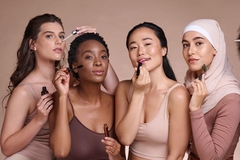AI beauty solutions: Next-gen skin care simulation services and hair diagnostic tools
09 Jul 2024 --- AI continues to make beauty brand interactions with consumers more personalized and multifunctional. From virtual try-on services branching out of makeup and into photorealistic skin care simulations to virtual scalp and hair care diagnostic therapy, the space is changing dynamically and rapidly.
Personal Care Insights explores the latest advances in AI-based beauty platforms with insights from Haut.AI and Unilever brands Dove, Ponds and BeautyHub PRO.
“Recently, we’ve made huge progress with our GenAI product, SkinGPT. SkinGPT leverages advanced AI to create synthetic images that illustrate how skin can change over time due to environmental factors and skin care products,” Anastasia Georgievskaya, co-founder and CEO at Haut.AI, tells us.
“This tool allows companies to offer their users the first-ever virtual skin care try-on, featuring photorealistic simulations grounded in scientific research.”

Another advancement is SkinChat, Haut.AI’s conversational AI tool. SkinChat allows users to upload photos for a detailed skin analysis and provides answers to their skin-related questions.
“From recommending skin care products to suggesting routines, SkinChat serves as a knowledgeable co-pilot, empowering companies to help their customers understand their skin better and make informed decisions about their skin care,” says Georgievskaya.
“Our Skin Consultant App guides users through their daily routines with tailored step-by-step instructions. Instead of merely listing recommended products, the app curates a selection of complementary daily-use skin care products that address specific concerns, enabling users to make the best choices for their skin.”
Pond’s Skin Institute launched AI Skin Expert in Indonesia and the Philippines late last year (Image credit: Unilever).Personalized beauty diagnostics
Unilever brand Pond’s Skin Institute launched AI Skin Expert in Indonesia and the Philippines late last year.
AI technology examines users’ selfies and carries out a skin analysis, helping consumers identify and understand their skin care concerns. The tool then shares customized recommendations from Pond’s range.
Since its launch, reportedly more than 30,000 consumers have used Pond’s Skin Institute’s AI Skin Expert, and the brand believes it will have over 100,000 users by the end of the year.
In hair care, Unilever brand Dove launched its virtual AI-powered Scalp + Hair Therapist — an interactive diagnostic tool accessed via Dove’s website.
Users start by answering questions about their scalp health and hair concerns. The tool, developed using generative AI capabilities and drawing on a wealth of expertise from Dove’s dermatologists, then generates a personalized scalp and hair profile and shares products that could “help make a difference.”
“It’s early days for Dove’s Scalp + Hair Therapist, but we’re so excited to be elevating the online experience for our consumers and sharing Dove’s expertise in an area where we’re seeing considerable interest,” says Rachel St. Fleur, associate director at Dove Hair, North America.
Links to buy the recommended products on Amazon are also included, giving shoppers a “seamless journey” from their first interaction to the point of purchase.
Unilever’s BeautyHub PRO is touted as an all-in-one platform that offers an AI-powered selfie tool giving product advice for skin and hair care.
Consumers in the Philippines and Thailand can complete a quiz and share a selfie. BeautyHub PRO then uses a type of AI, known as Computer Vision, to “see” and assess up to 30 visual data points and make personalized product recommendations based on several different Unilever brands.
“We’re excited about the possibilities AI can provide for Unilever and our consumers — and we’re committed to developing and deploying AI in line with our core values, Code of Business Principles and applicable legal and regulatory requirements,” explains Fahim Salim, global technology director, Beauty & Wellbeing at Unilever.
“While we have internal processes and guardrails to mitigate foreseeable AI risks, we’re aware that this is a space for continuous learning, and we aim to evolve our internal processes and efforts in line with delivering superior experiences for our consumers.”
Maintaining data validity
Haut.Ai works with a Human-in-the-Loop Approach in its R&D that emphasizes a “strong partnership between humans and machines.” “This ensures that our AI models are not only technically sound but also biologically relevant and aligned with real-world clinical practice,” Georgievskaya says.
“Our close collaboration with dermatologists provides invaluable insights into the latest research, clinical practices and patient needs, which we incorporate into our AI models. Regular sanity checks and feedback from dermatologists help us to validate our findings, refine our algorithms and develop truly innovative solutions that are backed by scientific evidence.”
Unilever maintains that every beauty advice generated through its AI platforms is based on peer-reviewed content that has been “meticulously evaluated by Unilever’s R&D, legal and regulatory teams. “Our tech partners and AI tools are also carefully vetted by these teams to ensure the security of the platforms and data shared,” highlights the FMCG giant.
Dove launched its virtual AI-powered Scalp + Hair Therapist (Image credit: Unilever).Monitoring EU AI Act
Beauty brands operating in this dynamic space are increasingly watchful of regulatory pressures surrounding novel AI applications. Possible risks include AI technologies with issues such as regulatory compliance, appearance bias and personalization.
“We’re definitely following the discussions around AI regulation in the EU very closely,” Georgievskaya at Haut.AI tells Personal Care Insights. “The proposed AI Act is quite comprehensive, and we’ve been assessing how it might apply to our business.”
The EU AI Act classifies AI systems into four categories: unacceptable risk (prohibited), high risk, limited risk and unregulated. “Based on our current understanding, our AI solutions likely fall into either the ‘limited risk’ or ‘unregulated’ categories of the Act,” says Georgievskaya.
“This is because we don't engage in activities like social scoring or real-time biometric identification, which are considered prohibited under the EU AI Act. Additionally, our software isn’t integrated into critical infrastructure, such as rail systems or vehicles, which is a key factor for ‘high-risk’ classification.”
While the EU AI Act is one of the most comprehensive frameworks currently being discussed, Haut.Ai is also monitoring other specific regulations and restrictions both locally and globally that could impact its business. “The GDPR, for example, is incredibly important for us in terms of how we handle data privacy and security. It has a direct impact on how we design and deploy our AI systems,” says Georgievskaya.
“For any operators in the AI space, it is crucial to keep in mind compliance with relevant regulations. It also means ensuring data quality, transparency about our AI models and always considering the ethical implications of how our technology is used. We believe that being proactive and responsible in these areas is not only good practice but also essential for building trust with our customers and the wider public.”
By Benjamin Ferrer














